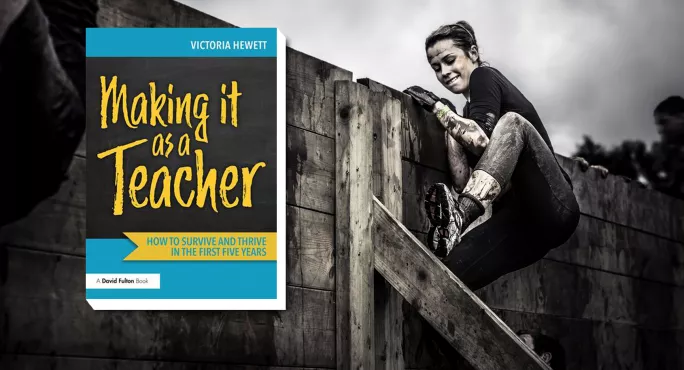- Home
- Book review: Making it as a Teacher
Book review: Making it as a Teacher

Making it as a Teacher: How to survive and thrive in the first five years
Author: Victoria Hewett
Publisher: Routledge
Details: 238 pages; £17.99
ISBN: 9781138593596
Training as a teacher at the moment can be a bit like living in a warzone. An average trainee has to dodge the bullets of pessimism, the missiles of workload and the tanks of education’s constantly shifting sands - all while getting to grips with the rollercoaster of emotions you experience in an average week in the classroom.
This practical book doesn’t try to sugarcoat the difficulties that teachers face. There are some damning indictments of the situations colleagues go through. But juxtaposed with each difficult experience are practical ways to survive and even thrive, no matter how tough times get.
The book is primarily about wellbeing and the various factors that underpin this, including professional and personal factors, wider structural pressures and self-care. What gives the advice in it more credibility is that Hewett herself, who blogs as @MrsHumanities, went through her own breakdown and recovery. This book serves as a bible of strategies she has used to transform her own career, interspersed with nuggets of advice from other professionals from across the teaching sphere.
Against the rather grim backdrop of Department for Education figures and statistics, there are insights and solutions to dip into; it’s the kind of book that could live on a shelf way past the first five years. I am 12 years in and am looking forward to trying some of the ideas myself.
Rather helpfully, the book is split into three sections: Making It, Surviving and Thriving. Within these sections are several chapters, encompassing every aspect of a teaching career. This structure ensures that negative experiences can be built on with ideas for long-term growth - after all, we spend so much of our time in the classroom that it must be more productive to enjoy it.
The first chapter encourages readers to reflect on why they became a teacher, using a format that is replicated in each chapter: practical activities to complete yourself, insights from professionals and a list of “takeaways” at the end, which are great as a reinforcement but also perfect for the busy teacher who hasn’t got time to digest everything. There are also little “Opportunity to think” boxes scattered through each chapter, inviting readers to stop and consider their own feelings. In our fast-paced, 100-miles-per-hour world, these are a welcome addition.
For much of the first chapter, I found myself nodding along with Hewett’s gems of wisdom, particularly her advice about following the teacher standards and trying too hard to be a “teacher” in her first few years. As an educator who wears her heart on her sleeve, I’ve always believed in building relationships and sharing information about myself with students. Hewett came to the same conclusion, asserting that not behaving like a “human teaching other humans,” can make you “unapproachable and unrelatable”.
But perhaps the best piece of advice, which will have data managers and progress leaders everywhere squirming in their seats, is to “forget progress in the first half term”. Instead, she gives the sage advice to use the first seven weeks to get to know your students, cementing classroom expectations and exploring where pupils are in terms of subject knowledge. I only wish my mentor had told me this all those years ago.
The chapter on “The Challenges of the Career” was all too familiar, and everything mentioned in it was depressingly relatable. Here, Hewett cleverly interweaves her own experience with national statistics, at times shining a spotlight on the irony displayed in schools. As a classic example, she was asked to create the school’s wellbeing policy, yet states: “I was falling apart because I had none.” Her bravery and honesty in sharing her story makes her the antidote to that annoying colleague in the staffroom who never has behaviour issues. Instead, her candid confessions, open vulnerability and steely determination make you feel inspired to succeed yourself.
The rest of the “Thrive” section is like a toolkit full of great ideas on setting up a classroom, forms of feedback and displays. Not only do these chapters contain innovative ideas, which are underpinned by research, but they also contain numerous diagrams and templates you can adapt, so they’re ready to try in your own classrooms.
Making it as a Teacher doesn’t deny or shy away from the problems we are facing in the profession; it acknowledges them and agrees that it is a challenge to avoid being part of that one-in-three statistic of teachers leaving the profession in the first five years. But, through its human approach, helpful structure and real-life case studies, it offers a positive message: you can do it. It’s a cathartic read - therapy in paperback form.
Haili Hughes is an English teacher at Saddleworth School in Oldham, Greater Manchester. She tweets @HughesHaili
You can support us by clicking the title link: we may earn a commission from Amazon on any purchase you make, at no extra cost to you.
Keep reading for just £1 per month
You've reached your limit of free articles this month. Subscribe for £1 per month for three months and get:
- Unlimited access to all Tes magazine content
- Exclusive subscriber-only stories
- Award-winning email newsletters



